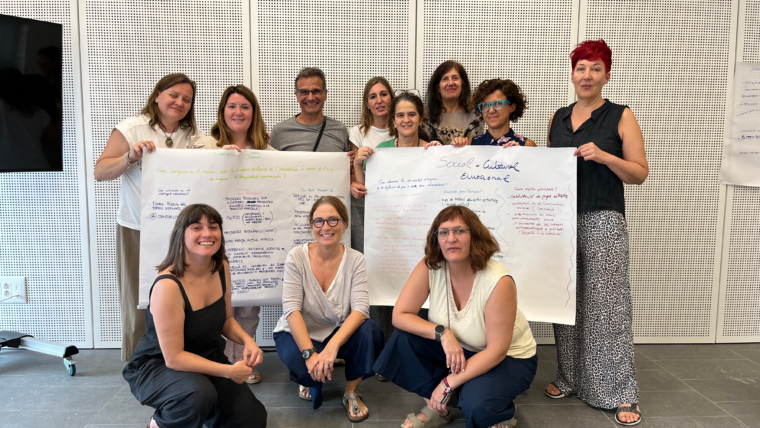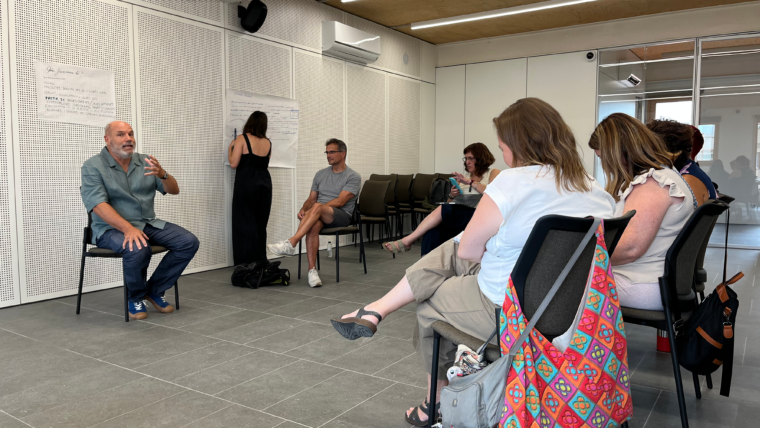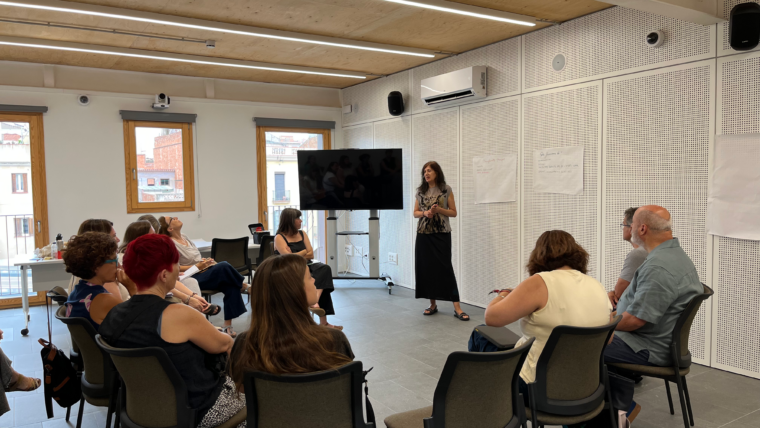Food Education Working Group: a space for sharing experiences around sustainability
On 9 July, representatives of educational and community action organisations that form part of the working group met at the Mercat de Sant Andreu to exchange ideas and build alliances.

The working group was created as part of the Healthy and Sustainable Food Strategy Barcelona 2030, a roadmap approved in 2022 that reflects the commitment of the Barcelona City Council and various third-sector organisations to promote a shift in the city’s food model. The group is led by the Associació Manjaretti, CREDA and the Food Institute, with the support of the City Council. It includes organisations such as Fundesplai, Antígona, the Federació d’Entitats de Calàbria 66 with its community kitchen project in Sant Antoni, the Aprofitem els Aliments Platform, Slow Food, as well as the Catalonia Public Health Agency and the Barcelona Public Health Agency, among others.
Under the title ‘Weaving Food Sustainability,’ the session aimed to foster a space for dialogue between third-sector organisations and institutions to work on awareness-raising and promotional efforts related to food sustainability.
Mescladís: an exemplary model of food, social and economic sustainability
Martín Habiague, Managing Director and founder of Mescladís, gave a talk on the journey of this project, which they describe as ‘a social producer’. The project was launched twenty years ago in response to the social changes taking place in Barcelona, particularly the arrival of migrants who faced barriers to inclusion in the city’s labour market and social fabric.
Mescladís grew out of a desire to become a sustainable model for managing migration. It is a model to follow not only in terms of food sustainability, but also social, economic and emotional sustainability. Its five restaurants, catering service and cooking workshops enable this social action project to be economically self-sustaining, without the need to rely on grants. ‘Grants are there to make us stronger, but we must be sustainable without them,’ says Habiague.
Social sustainability means guaranteeing employment for migrants who receive training in its workshops. This support creates emotional sustainability: ‘We are passionate about the world of restaurants, but our work has a dual purpose. We are also mentors, and we seek to create these spaces of support.’
Challenges and goals of food education
Participants in the session then worked in two groups to explore various dimensions of sustainability in response to two key questions on the current challenges of sustainable food.
On the one hand, how can we address the diversity of backgrounds when defining what constitutes good food? Several proposals were put forward, from viewing kitchens as spaces of transformation to promoting awareness of sustainable food through content creators from diverse backgrounds. Good practices were also acknowledged, such as the guides for incorporating a sociocultural perspective into food, and the main challenge identified was how to integrate these contents concretely into the school curriculum.
On the other hand, how can we incorporate the issue of access, linked to economic inequalities, into the discourse on the ecological dimension of food? In this context, numerous school canteens and residential care home projects incorporate organic and locally sourced products. Even so, challenges persist, starting with the false narrative that eating healthier and organic food is more expensive.
The exchange will continue next year
These sessions provide a valuable space for the organisations involved in the group, as they share similar areas of work and often face the same challenges and concerns. This exchange enables them to grow individually, but also as a network, fostering connections from which new projects sometimes emerge.
If you are an organisation working in food education, we encourage you to join the City Agreement of the Healthy and Sustainable Food Strategy Barcelona 2030 and the working group. You simply need to send an email to estrategiaalimentaciosostenible2030@bcn.cat.



